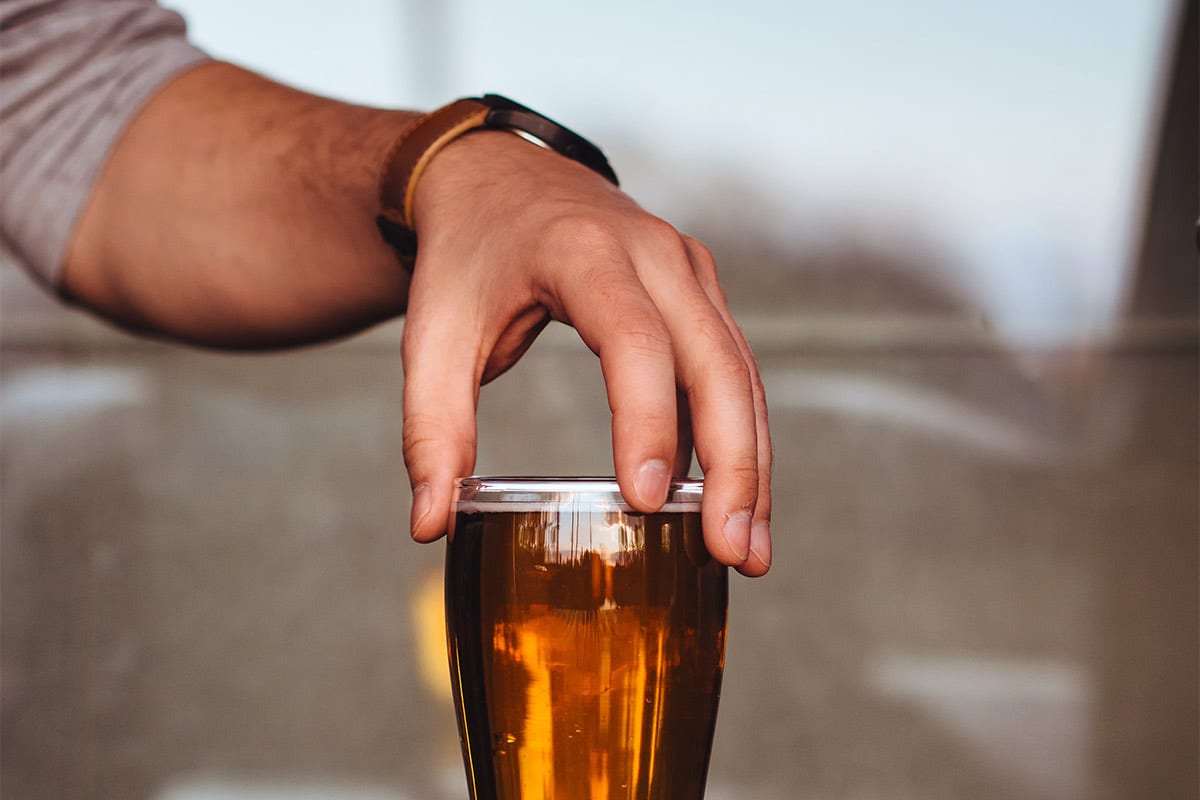 If you’re trying to quit drinking, you’re not alone. Today, more and more Americans are putting alcohol away and planning to make it permanent. New trends in alcohol-free beer and wine, alcohol-free clubs and bars, and social events that are “sober only” are testament to the fact that people are tired of alcohol being the center of every social event and outing. That’s a good thing, especially as alcohol is extremely unhealthy for many people. Today, 47.5% of the American population drinks, which is lower than it’s ever been, but 10.6% of the population has an alcohol use disorder – meaning 1 in 5 Americans who drink have a problematic relationship with alcohol.
If you’re trying to quit drinking, you’re not alone. Today, more and more Americans are putting alcohol away and planning to make it permanent. New trends in alcohol-free beer and wine, alcohol-free clubs and bars, and social events that are “sober only” are testament to the fact that people are tired of alcohol being the center of every social event and outing. That’s a good thing, especially as alcohol is extremely unhealthy for many people. Today, 47.5% of the American population drinks, which is lower than it’s ever been, but 10.6% of the population has an alcohol use disorder – meaning 1 in 5 Americans who drink have a problematic relationship with alcohol.
Wanting to cut back, to stop drinking alcohol, and to improve your health, your social life, and your relationship with people around you is understandable. It’s admirable. Unfortunately, quitting alcohol can be challenging, especially if you’re a heavy drinker. The key is to go slow, to make plans, and don’t give up, even when you have setbacks. You’ve got this, and here are 10 steps to get started.
It’s important to sit down with someone who knows what they are doing and who can help you. Making a plan means realistically assessing your substance use, setting reasonable goals, laying out steps, realizing that quitting alcohol won’t be a straight progression of A to B, and figuring out how you’re going to ask for help.
It’s important that your plan is realistic, achievable, and measurable. For example, if you’ve been drinking every day for years, it’s unrealistic that you would put alcohol down tomorrow and never touch it ever again. In fact, that could be dangerous because chances are, you’re in the high risk group for delirium tremens. You should also consult with a doctor to see what they recommend and how they think you could safely go about quitting alcohol.
Good plans don’t ask you to change overnight or to suddenly have good habits and good behavior. They ask you to work on building the skills you need over time, so you have the foundations to be sober.
Setting goals gives you a good way to track how you’re doing on quitting alcohol. Goals can also vary a lot based on your specific situation. So, you might have any of the following:
It’s also important to keep your goals measurable and achievable. “Don’t drink again ever” is not a reasonable or achievable goal. “Go at least 30 days without alcohol” is, because if you fail, you can restart and keep going.
It’s important that you understand why you’re trying to quit alcohol. Knowing your motivations for quitting your alcohol will keep you more on track for staying sober. Why? You can remind yourself and reference back to motivation every time you want to drink. Motivations are usually about a combination of personal motivation “I want to do this for myself” and also about others “I want to be a better parent”.
But, understanding those motivations is a crucial part of inspiring yourself to stay sober.
 Alcohol can influence your behavior, your attitude, and the way you think. It can be so insidious that you might find yourself doing things like autopiloting getting home and opening up a beer – or autopiloting stopping at the liquor store and buying alcohol. Changing that behavior can be extremely difficult. Chances are pretty high that you do need help. That help might be in the form of your friends and family supporting you. However, it’s more likely that you’ll need different kinds of help. That can mean:
Alcohol can influence your behavior, your attitude, and the way you think. It can be so insidious that you might find yourself doing things like autopiloting getting home and opening up a beer – or autopiloting stopping at the liquor store and buying alcohol. Changing that behavior can be extremely difficult. Chances are pretty high that you do need help. That help might be in the form of your friends and family supporting you. However, it’s more likely that you’ll need different kinds of help. That can mean:
Help comes in a lot of different ways, and asking for different kinds of help is important.
 It’s always a good idea to take small steps and to go slow. Keep in mind that those steps can enable you to keep drinking if you go slow enough. However, if done right, going slow should allow you to build skills to cope with cravings, to reduce your alcohol tolerance, and to quit alcohol safely. That might mean looking into rehab and going to treatment rather than just quitting cold turkey.
It’s always a good idea to take small steps and to go slow. Keep in mind that those steps can enable you to keep drinking if you go slow enough. However, if done right, going slow should allow you to build skills to cope with cravings, to reduce your alcohol tolerance, and to quit alcohol safely. That might mean looking into rehab and going to treatment rather than just quitting cold turkey.
It might mean reducing your alcohol consumption and breaking your habit of drinking every day before you just quit. It might mean finding a sober home and support so you can quit without putting yourself at risk. However it should always involve being careful, understanding risks, and trying to build skills up so that you can manage when you do go for full sobriety.
It’s important to remove alcohol from your home. It’s also a good idea to take steps to make it harder for you to just buy alcohol whenever you feel like it. For example, not taking your debit or credit card with you when you’re not going specifically to buy groceries. Some banks even allow you to block purchases of alcohol at bars and at liquor stores – although they’ll be less able to do this if you’re buying at a grocery store.
Still, those small steps can mean a lot for reducing your total access to alcohol.
If you know what triggers you to want to drink, you can take steps to reduce those triggers and to find better coping mechanisms. For example, some people drink at home just because they built up the habit of getting home and opening up a beer. Then one leads to another and so on. Breaking that kind of habit can be difficult. On the other hand, you might have started that kind of habit to cope with stress from work or commute. Learning coping mechanisms for that stress would help you to not need the alcohol when you get home. Or, if you drink as a social lubricant, figuring out how to feel better about social interactions without alcohol will help. But, it starts with knowing when you want to drink. That can mean spending a few weeks writing down every time you think about drinking, when you experience cravings, and when you just go for alcohol – as well as what happened at the moment. That will allow you to better understand yourself and what you use alcohol for.
Once you know why you’re drinking, you can look for better coping mechanisms to that why. Being frustrated at work might mean you can blow off steam exercising. But it might also mean making changes to your career or your role at work so that you experience less stress. Learning mindfulness can help you experience less stress from traffic. You might need assistance with debt or mental health treatment. People drink for a wide range of reasons, but often to self-medicate. Understanding the why and what you are drinking for will help you to build coping mechanisms that work to combat cravings by fixing the underlying issue.
Of course, you’ll also need short term coping mechanisms to help you make it through cravings. For example, having time out or 15 minutes to divert your attention away from drinking, doing something challenging with exercise, playing a game on your phone, etc.
Having support is a crucial part of learning new skills, of navigating difficult emotions, and of making change. If you’re lucky, that will be your friends and family. However, friends and family might not be available. They might be going through too much to make space for you. And, they might not be in the right place. Feeling open to looking for support in self help groups like AA, LifeRing, and Smart Recovery is important. You can also look for support in sober homes and sober assistants, where you’ll have people around to help you stay accountable and sober.
 Going through withdrawal and learning to live without alcohol can be extremely challenging. Professional help can ensure you have the mental and physical tools to do so. For example, medication assisted treatment can reduce cravings and withdrawal symptoms while you learn the mental skills to stay clean and sober. Therapy can help you to tackle the underlying problems and behavioral problems behind substance abuse. And having that professional support can ensure that you safely navigate the challenges of getting sober – so you can build a life you want to with support at every stage.
Going through withdrawal and learning to live without alcohol can be extremely challenging. Professional help can ensure you have the mental and physical tools to do so. For example, medication assisted treatment can reduce cravings and withdrawal symptoms while you learn the mental skills to stay clean and sober. Therapy can help you to tackle the underlying problems and behavioral problems behind substance abuse. And having that professional support can ensure that you safely navigate the challenges of getting sober – so you can build a life you want to with support at every stage.
Quitting alcohol is a big step. It’s often the right choice and a healthy choice for you and for everyone around you. At the same time, it’s likely something that requires time, support from multiple people, and commitment from you. Good luck quitting and congratulations on choosing sobriety.
Asana Recovery is located in Orange County, California. and offers detox, residential, and outpatient addiction treatment services in our modern and comfortable addiction treatment facilities. Please contact us today to speak with one of our experienced addiction treatment team if you have any questions about our programs.
© Copyright 2024 Asana Recovery™ | All Rights Reserved | Privacy Policy
Asana Recovery
We firmly believe that the internet should be available and accessible to anyone, and are committed to providing a website that is accessible to the widest possible audience, regardless of circumstance and ability.
To fulfill this, we aim to adhere as strictly as possible to the World Wide Web Consortium’s (W3C) Web Content Accessibility Guidelines 2.1 (WCAG 2.1) at the AA level. These guidelines explain how to make web content accessible to people with a wide array of disabilities. Complying with those guidelines helps us ensure that the website is accessible to all people: blind people, people with motor impairments, visual impairment, cognitive disabilities, and more.
This website utilizes various technologies that are meant to make it as accessible as possible at all times. We utilize an accessibility interface that allows persons with specific disabilities to adjust the website’s UI (user interface) and design it to their personal needs.
Additionally, the website utilizes an AI-based application that runs in the background and optimizes its accessibility level constantly. This application remediates the website’s HTML, adapts Its functionality and behavior for screen-readers used by the blind users, and for keyboard functions used by individuals with motor impairments.
If you’ve found a malfunction or have ideas for improvement, we’ll be happy to hear from you. You can reach out to the website’s operators by using the following email
Our website implements the ARIA attributes (Accessible Rich Internet Applications) technique, alongside various different behavioral changes, to ensure blind users visiting with screen-readers are able to read, comprehend, and enjoy the website’s functions. As soon as a user with a screen-reader enters your site, they immediately receive a prompt to enter the Screen-Reader Profile so they can browse and operate your site effectively. Here’s how our website covers some of the most important screen-reader requirements, alongside console screenshots of code examples:
Screen-reader optimization: we run a background process that learns the website’s components from top to bottom, to ensure ongoing compliance even when updating the website. In this process, we provide screen-readers with meaningful data using the ARIA set of attributes. For example, we provide accurate form labels; descriptions for actionable icons (social media icons, search icons, cart icons, etc.); validation guidance for form inputs; element roles such as buttons, menus, modal dialogues (popups), and others. Additionally, the background process scans all the website’s images and provides an accurate and meaningful image-object-recognition-based description as an ALT (alternate text) tag for images that are not described. It will also extract texts that are embedded within the image, using an OCR (optical character recognition) technology. To turn on screen-reader adjustments at any time, users need only to press the Alt+1 keyboard combination. Screen-reader users also get automatic announcements to turn the Screen-reader mode on as soon as they enter the website.
These adjustments are compatible with all popular screen readers, including JAWS and NVDA.
Keyboard navigation optimization: The background process also adjusts the website’s HTML, and adds various behaviors using JavaScript code to make the website operable by the keyboard. This includes the ability to navigate the website using the Tab and Shift+Tab keys, operate dropdowns with the arrow keys, close them with Esc, trigger buttons and links using the Enter key, navigate between radio and checkbox elements using the arrow keys, and fill them in with the Spacebar or Enter key.Additionally, keyboard users will find quick-navigation and content-skip menus, available at any time by clicking Alt+1, or as the first elements of the site while navigating with the keyboard. The background process also handles triggered popups by moving the keyboard focus towards them as soon as they appear, and not allow the focus drift outside it.
Users can also use shortcuts such as “M” (menus), “H” (headings), “F” (forms), “B” (buttons), and “G” (graphics) to jump to specific elements.
We aim to support the widest array of browsers and assistive technologies as possible, so our users can choose the best fitting tools for them, with as few limitations as possible. Therefore, we have worked very hard to be able to support all major systems that comprise over 95% of the user market share including Google Chrome, Mozilla Firefox, Apple Safari, Opera and Microsoft Edge, JAWS and NVDA (screen readers).
Despite our very best efforts to allow anybody to adjust the website to their needs. There may still be pages or sections that are not fully accessible, are in the process of becoming accessible, or are lacking an adequate technological solution to make them accessible. Still, we are continually improving our accessibility, adding, updating and improving its options and features, and developing and adopting new technologies. All this is meant to reach the optimal level of accessibility, following technological advancements. For any assistance, please reach out to